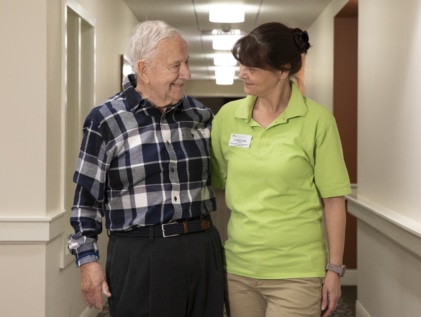As the average life expectancy continues to increase, so does the number of Americans making caregiving decisions on behalf of an elderly parent or family member. Reaching the point of realizing that a senior family member cannot live on their own without some assistance is an emotional process. Furthermore, figuring out what sort of care arrangements are available and would most suit your loved one’s needs can be confusing and stressful. It’s essential to have an understanding of the different types of caregivers that can provide care to your loved one.
Family Caregiver
The most common type of senior caregiver is the family caregiver, with over 40 million Americans providing care for a loved one. A family caregiver is typically a relative who is responsible for assisting with activities of daily life, providing transportation, coordinating and managing medical care, providing opportunities for mental engagement and physical activity, and assessing finances. As a family caregiver, you may be providing care to your loved one in their own home, or you may decide to move them into yours. Regardless of the situation, providing unpaid care to a loved one can simultaneously be incredibly fulfilling and stressful.
Professional Caregiver
Professional caregivers are hired to come into the home of your loved one to provide medical or non-medical care. Professional caregivers often work for an agency that is hired to provide and place the right caregiver for you. Alternatively, they may work as an independent caregiver and be employed directly by you or your loved one. If your loved one lives in your home, you may decide to hire a caregiver to come in and provide care while you are working or when you need a bit of respite.
Private Duty Caregiver
A private duty caregiver can provide a broad range of services in addition to medical care. Private duty caregivers can be hired to provide transportation, help with meal preparation and personal care, assist with house chores, and provide companionship. The ultimate goal of a private duty caregiver is to ensure that your loved one can live as independently as possible in their own home.
Informal Caregiver
An informal caregiver is typically a friend, neighbor, or volunteer who is not directly related to your loved one but most likely has a personal relationship with them. Typically, an informal caregiver would be unpaid and willing to help with simple tasks like running errands, providing companionship, and light household chores. This may be an excellent option for a senior who wants to age in place but needs a bit of help with their daily to-do list.
If you’ve considered the above options and are unconvinced that any of them would be a good fit for your loved one, it may be time to consider a senior living community. Making a move to a senior living community would provide your loved one with opportunities to socialize, stay engaged, and receive the appropriate level of medical care and attention that they need.

